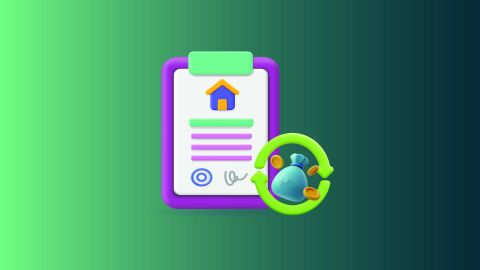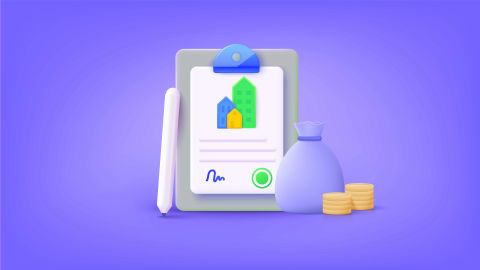Tax benefits on your loan against property
Both salaried and self-employed professionals can benefit from loan against property. Individuals can pledge residential or commercial properties as collateral to borrow funds to meet their financial requirements. For instance, Bajaj Finserv’s Loan Against Property offers a maximum loan amount of up to Rs. 10.50 Crore* for salaried individuals.
Being a secured loan, loan against property offers competitive loan against property interest rates compared to unsecured loans. They are long-term commitments with longer repayment tenures. For example, Bajaj Finserv offers a loan against property with a tenure up to 15 years*.
Did you know that a loan against property is not just a financial solution but also a tool to grow your business? By pledging your residential or commercial property, you can access funds to expand your business, invest in new equipment, or improve cash flow. With Bajaj Finserv Loan Against Property, benefit from competitive interest rates and long repayment tenures that ease your financial commitments. Get loan of up to Rs. 10.50 crore against your property within 72 hours* of the approval.
Additional Read: Fees and charges of Loan Against Property: Explained
Tax benefit under Section 24(b)
When you borrow a loan for purchasing a house, construction purpose, renovating or repairing your existing house, as a taxpayer you can claim a deduction on the interest of this loan under Section 24(b) of the Income Tax Act.
1. Home loan interest deduction for self-occupied property:
If the loan is taken for a self-occupied property (i.e., the individual and family reside in the house), the maximum deduction allowed is up to Rs. 2 lakh per financial year.
2. Home loan interest deduction for let-out or deemed to be let-out property:
If the property is not self-occupied (let-out or deemed to be let-out), there is no upper limit on the interest deduction. The actual interest paid on the home loan during the financial year can be claimed as a deduction.
3. Additional deduction for affordable housing:
An additional deduction of up to Rs. 1.5 lakh is available on interest paid for loans taken for the purchase of an affordable house. This deduction is available from the financial year 2019-20 onwards.
4. Conditions for deduction:
- The loan must be for the purpose of purchase or construction of a residential property.
- The construction or acquisition must be completed within 5 years from the end of the financial year in which the loan was taken.
If you are looking for significant funds to achieve your goals, a loan against property is your best bet. It offers higher loan amounts compared to unsecured options. With Bajaj Finance, you can get up to Rs. 10.50 crore*, ensuring you have enough to meet your big-ticket expenses like higher education, home renovation, or even consolidating other debts. Get loan of up to Rs. 10.50 crore against your property within 72 hours* of the approval.
No tax exemption will be provided in the following scenarios
In case you apply for a loan against property to use the amount for purposes such as education, marriage, travel or medical bills - then these won’t be covered under tax exemption.
These scenarios include situations where the loan amount is used for purposes such as education, marriage, travel, or medical bills. Here is a breakdown:
1. Loan usage for non-housing purposes:
If you take a loan against property with the intention of using the funds for non-housing purposes like education, marriage, travel, or medical expenses, the interest paid on such loans may not qualify for tax exemption.
2. Non-qualifying expenses:
Certain expenses, such as those related to education, marriage, travel, or medical bills, are not considered eligible for tax benefits when incurred through a loan against property. The tax laws typically provide deductions for specific purposes like home purchase, construction, or renovation.
3. Distinguishing eligible and non-eligible expenses:
Tax laws generally distinguish between expenses that qualify for deductions and those that do not. While loan against property can offer tax benefits for housing-related purposes, using the loan for non-eligible expenses may not provide any tax exemptions.
Tax benefits from loan against property
A loan against property gives you funds for your varied needs; you can also claim tax exemption on the interest paid for availing of the loan. Here’s how you can save your tax with a loan against property:
- You can claim tax exemption from a loan against property if the loan amount is utilised for business purposes. In such cases, benefits can be claimed against interest paid and associated fees and charges incurred. These payables can be claimed as business expenses under Section 37(1) of the Indian Income Tax Act.
- Salaried individuals can also claim benefits under Section 24(B) of the Income Tax Act if the borrowed funds are utilised for funding the purchase of another residential property. The maximum deduction one can claim is Rs. 2 lakh. However, you will only be allowed to avail of the benefits if you could successfully establish a link between the borrowed funds and their end-use in accordance with Section 24(B).
- You can’t claim tax benefits if you are utilising the funds to transform the mortgaged property.
- Both Section 37(1) and Section 24(B) enables you to claim deductions only on the interest paid and not on the principal repaid.
- You can’t avail of tax exemptions if the borrowed sum is utilised to fund personal expenses like marriage, education, vacation, etc.
- Unlike home loans, you cannot claim tax exemption from loan against property under section 80C, as under this section, an individual can only claim exemption against entirely constructed residential properties.
Thus, a loan against property apart from providing funds for varied needs also helps you save on taxes.
Additional read: How to apply for a Loan Against Property: A step by step guide
With repayment tenures of up to 15 years*, a loan against property provides ample time to manage your finances. Whether you are planning to fund your child’s education abroad or finance your dream wedding, the flexible tenure ensures you can repay conveniently without stretching your budget. By using your property as collateral, you can unlock access to large funds of up to Rs. 10.50 crore—it is a smart way to manage your finances with ease! Get funds within 72 hours* of approval.
DISCLAIMER:
While care is taken to update the information, products, and services included in or available on our website and related platforms/websites, there may be inadvertent inaccuracies or typographical errors or delays in updating the information. The material contained in this site, and on associated web pages, is for reference and general information purpose and the details mentioned in the respective product/service document shall prevail in case of any inconsistency. Subscribers and users should seek professional advice before acting on the basis of the information contained herein. Please take an informed decision with respect to any product or service after going through the relevant product/service document and applicable terms and conditions. In case any inconsistencies observed, please click on reach us.
*Terms and conditions apply








